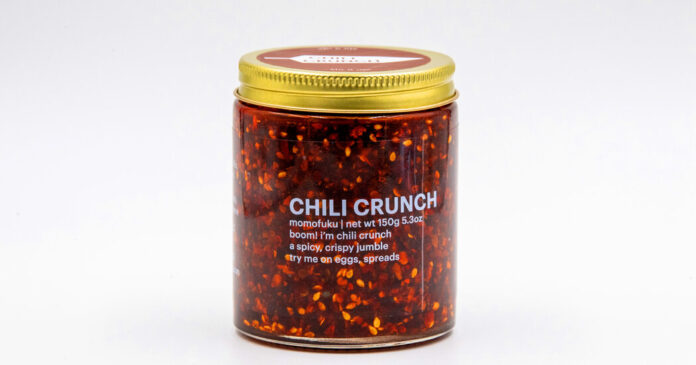It’s hard to pinpoint exactly when we reached peak chile crisp in the United States, but if you were to inspect my kitchen today you’d see, alongside an old jar of Lao Gan Ma — years ago, the only chile crisp I could easily find in the food shops nearby — at least a half-dozen others.
While each jar contains a spicy crimson sediment under oil, some have the sweetness of star anise, while others are deepened with tiny dried shrimp or fried shallots. Some have the delicate crunch of fried sesame seeds, garlic or crushed peanuts, or the mouth-numbing tingle of Sichuan peppercorns.
Some of these preparations are rooted in regional Chinese or diasporic traditions, family customs or someone’s idiosyncratic taste, and each is different from the others. (Yes, I really do need them all!)
You might call these condiments chile oil or chile crisp or chile crunch, and the truth is that I didn’t give the precise language of the category too much thought until Thursday.
That’s when The Guardian reported that Momofuku, the global culinary company founded by the celebrity chef David Chang, owned the trademark for the term “chile crunch” and was moving to protect it, while seeking similar trademark status for “chili crunch,” spelled with an “i.”
Momofuku has been sending cease-and-desist letters to other food companies that use either phrase in their marketing, and several have already stopped, fearing a costly legal fight, according to The Guardian.
But how can anyone presume to own the English translation for a basic condiment? Like mustard and mayonnaise, chile crunch might inspire feverish brand loyalty, but surely it’s impossible to own.
All kinds of battles play out in the condiment aisle, where immigrant foods are strategically packaged for American consumers. The more success a condiment finds and the more identifiable it becomes to consumers, the more intense these skirmishes become.
Perhaps the best-known recent branding tussle involved sriracha. Though Huy Fong Foods popularized its version of the squeezable chile sauce in the United States, David Tran, the company’s Vietnam-born owner, hadn’t trademarked the word, which he’d borrowed from Thai cooks.
By the time he realized its popularity, it was too late. Sriracha had leveled up. It was in fast-food restaurants and fine-dining and packaged foods and ramen. By then, “sriracha” had become a shared cultural reference point in the United States. For better or for worse, it didn’t belong to anyone.
Momofuku is a big company doing what big companies do, protecting its brand; it contends that its chile crunch is so distinctive and has become so well-known since it debuted in 2020 that it defines the term. Notably, it acquired the trademark for “chile crunch” in a legal settlement after a rival company accused it of trademark infringement, according to The Guardian. (Mr. Chang did not immediately respond to a request for comment.)
“It should never have been trademarked,” said Jing Gao, who owns the company Fly By Jing, whose Sichuan chile crisp helped popularize the condiment. “It’s a descriptive, generic, cultural term, but in Chinese, there are numerous ways of referring to sauces like these with tons of variations, regional styles and techniques.”
Chile crisp and chile crunch have become the American vernacular for all of them. Though Lao Gan Ma, with its recognizable red label, was one of the few commercialized versions of chile crisp available in the United States a decade ago, that condiment opened the door for a competitive, fast-growing category in the last few years.
Ownership seems antithetical to its pleasures. Chile crisp isn’t a precise condiment with a rigid definition, but one translation for an extended family of condiments with infinite variations, a basic template that seems to invite playfulness, variation and adaptation across kitchens.
At least five businesses that received letters from Momofuku have desisted, but not Homiah. Michelle Tew is the tiny company’s owner and only full-time employee, and Ms. Gao is an investor in it. Ms. Tew’s shrimp-rich chile sauce is a Malay product that she wasn’t sure how to market when she started raising funds through Kickstarter in 2021.
How could she translate her family’s condiment for American consumers? She settled on “sambal chile crunch” because it clicked for people and caused the least confusion.
“I’m going to chance it and see how it goes,” said Ms. Tew, whom Momofuku gave 90 days to respond. “If I don’t stand my ground, it would be a very successful strategy for Momofuku.”
Follow New York Times Cooking on Instagram, Facebook, YouTube, TikTok and Pinterest. Get regular updates from New York Times Cooking, with recipe suggestions, cooking tips and shopping advice.



